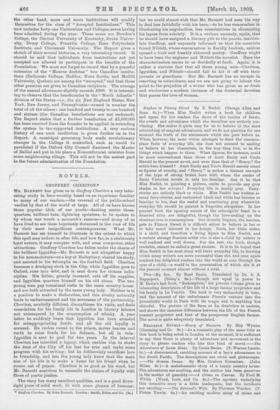NO S.
GEOFFREY CHERITON.*
BARNETT has given us in Geoffrey Cheriton a very inter- esting study in hero-worship based on an experience familiar to many of our readers,—the reversal of the public-school verdict by that of the world at large. All of us have known those popular idols of our youth—dashing centre three- quarters, brilliant bats, lightning sprinters, to be spoken to by whom was worth a monarch's ransom—and many of us have lived to see them hopelessly distanced in the race of life by their most insignificant contemporaries. What Mr, Barnett has set himself to illustrate is the extent to which this spell may endure in after life, and how far, in a stubbornly loyal nature, it may compete with, and even overpower, other attractions. Geoffrey Cheriton has fallen under the charm of the brilliant Iggulden—Mr. Barnett is not altogether happy In his nomenclature—as a boy at Haileybury, shared his study, and assisted in his triumphs on the football field. Cheriton becomes a drudging clerk in the City, while Iggulden goes to Oxford, runs into debt, and is sent down for riotous India. cipline. His father, greatly incensed, cuts off his supplies, and Iggulden quarters himself on his old chum. The two young men pay occasional visits to the same country house, and are both attracted by the same young lady. Neither is in a position to make a declaration, and this rivalry naturally leads to embarrassment and the severance of the partnership. Cheriton, morbidly diffident, discontinues his visits, and finds consolation for his lonely life in London in literary labours not untempered by the consumption of whisky. A year latter he suddenly bears that Iggulden has been arrested for misappropriating funds, and all the old loyalty is aroused. He rushes round to the prison, moves heaven and earth to raise funds for his defence, but all in vain : Iggulden is sent to gaol for two years. In the interval Chariton has inherited a legacy, which enables him to shake the dust of the City off his feet for ever and make some progress with his writing; but be deliberately sacrifices love to friendship, and lets the young lady know that the main aim of his life is to make a home for his friend when he comes out a prison. Cheriton is as good as his word, but Mr. Bareett contrives to reconcile the claims a loyalty with those of poetic justice.
The story has many excellent qualities, and is a good down- right piece of solid work, lit with some gleams of humour; • Geoffrey Clanton.. By John Barnett. London : Smith, Elder, end Co. [Ge.]. but we could almost wish that Mr. Barnett had seen his way to deal less faithfully with his berm—to be less remorseless in illustrating his angularities, less conscientious in chronicling his lapses from sobriety. It is a curious anomaly, again, that he should have assigned a literary gift to the gauche, inarticu- late Geoffrey, and expressly informed us that his eccentric: friend Niblett, whose conversation is floridly bookish, seldom opened a book and frankly abhorred poetry. Geoffrey ought to have been the engineer and Niblett the novelist. Here the characterisation seems to us decidedly at fault. Again, it is rather a curious fact that all three young men—Cheriton, Iggulden, and Niblett—should fail to hit it off with their parents or guardians. But Mr. Barnett has no scruple in resorting to coincidence, and we are not going to labour the point to the prejudice of a writer who has given us so fresh and wholesome a modern instance of the fraternal devotion that passes the love of woman.










































 Previous page
Previous page